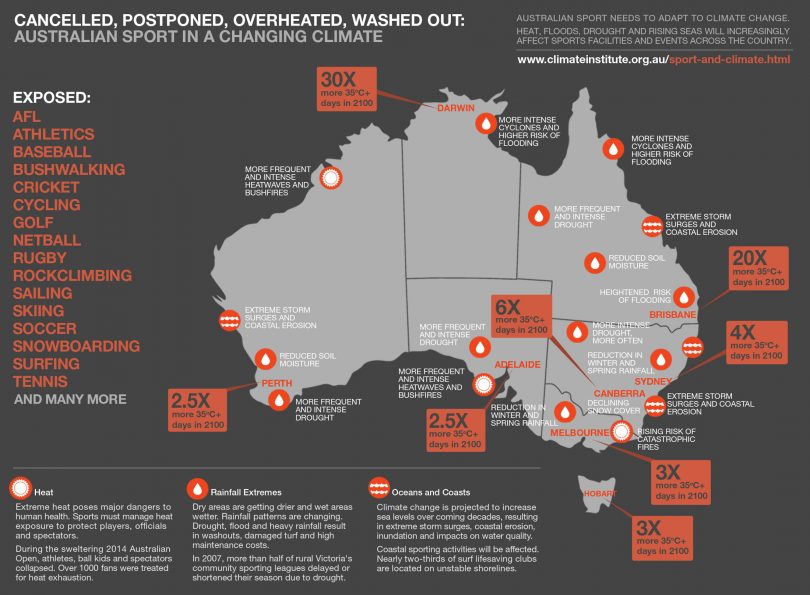
The report said all sports, but especially summer sports, will be affected by climate change. Photo: File.
Climate change will create a scheduling nightmare for sports across the territory according to a new report by the Commissioner for Sustainability and the Environment, which warns that elite and amateur athletes will suffer as temperatures are set to soar.
The report says there is no Canberra-specific sport and active recreation strategy beyond 2020 that can meet the challenges of climate change, as scientists expect an increase of hotter days, extreme heatwaves and higher minimum temperatures.
“Few, if any, sports are insulated against the accelerating consequences of climate change,” the report reads. “No participants will be immune from the consequences of climate change.
“Understanding heat exposure as a genuine health threat and sporting challenge, and reducing exposure will become a critical challenge as the ACT experiences more frequent, and more intense heatwaves.”
The report’s co-author Professor Kate Auty said climate change will affect every single sport in years to come, warning that sports organisers could soon be forced to schedule summer sports during autumn or spring due to the heat, which will cause a “crush effect” on the sports calendar.
“Even indoor sports will feel the pressure because the minute people can’t use the oval, they will be looking for indoor facilities,” Professor Auty told Region Media. “Scheduling struck me as a critical issue in the report.
“I know a lot of women who play sport and I think there is a potential that women will find themselves bumped for men’s sport which is something we need to make sure does not happen.”
Professor Auty said elite athletes are already experiencing climate change challenges, competing under the burden of expectation that they will push through environmental barriers and extreme heat to still compete.
The report said that duty-of-care thresholds vary across sports, ranging from 32°C to 41°C, and even Sports Medicine Australia’s heat policy has some “serious limitations” in the current environment, including sun exposure.
Professor Auty said the potential for costly legal action due to climate change injuries is real and the cases for climate change litigation are increasing.
“Provision of water and shade during or after the heat or extreme event will arguably not provide a defence to potential litigation, particularly if the athletes are young and vulnerable,” she said. “In the absence of highly effective monitoring, sport organisations and administrators should adopt a cautious approach.
“Climate change and other environmental factors are starting to challenge the established rules in sport and in law.
“Sport administrators, often volunteers, need to be equipped to deal with these changing environmental conditions. A robust and coordinated response across the sport sector is increasingly necessary.”
Read the full report here.

Sport across the nation will be forced to cancel or postpone their events. Graph: Australia Institute.












